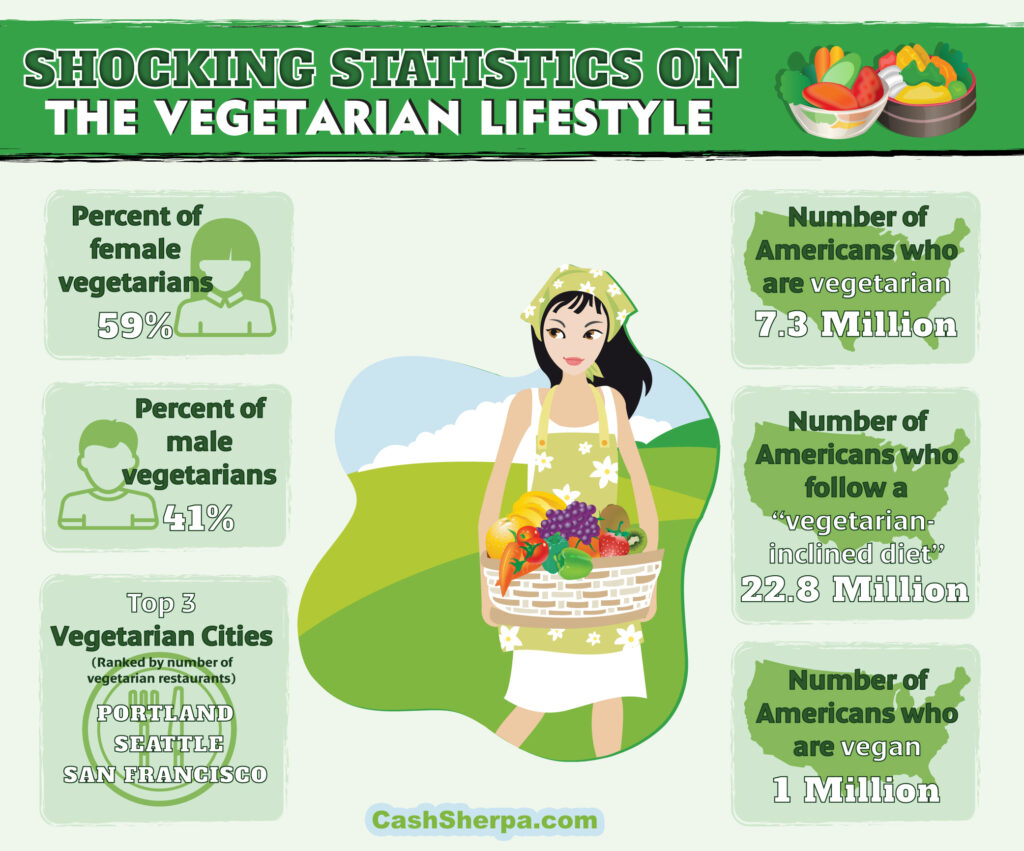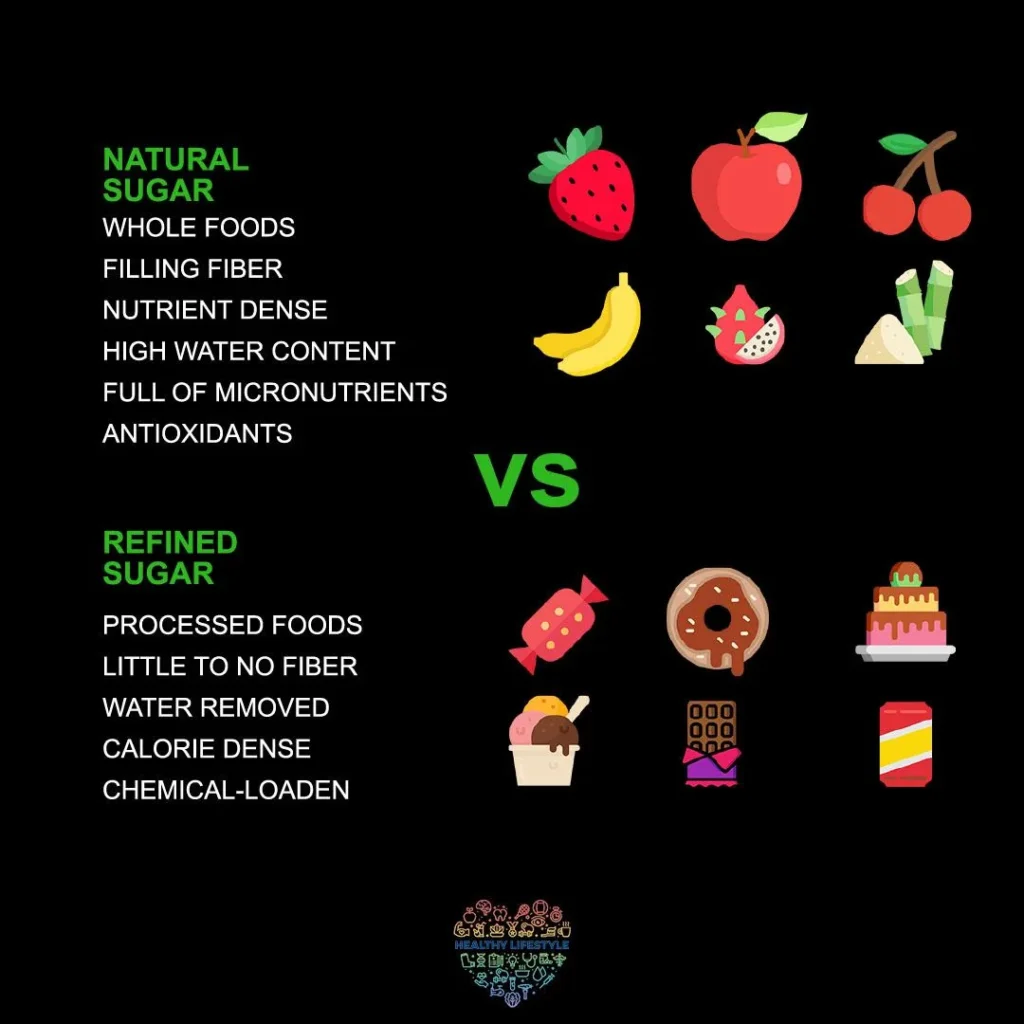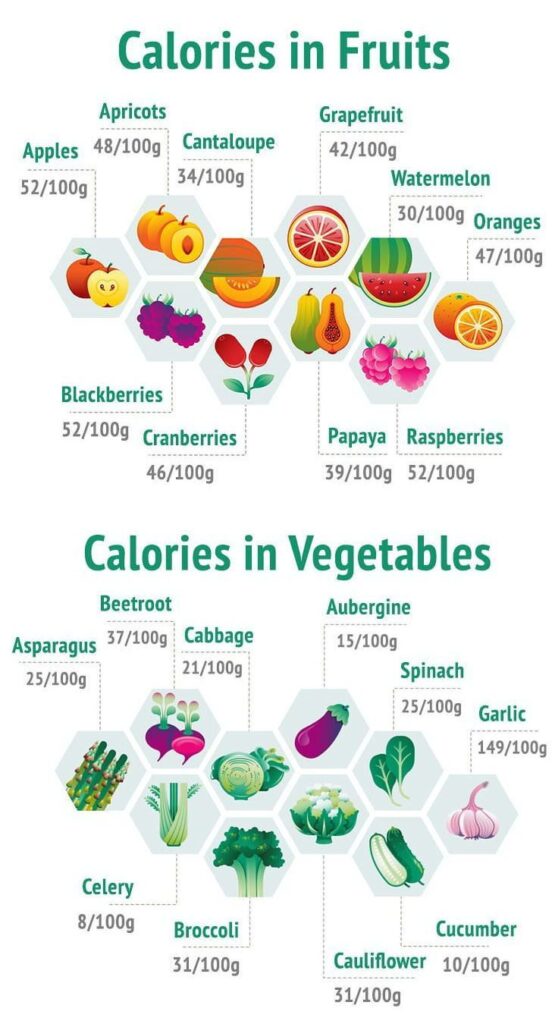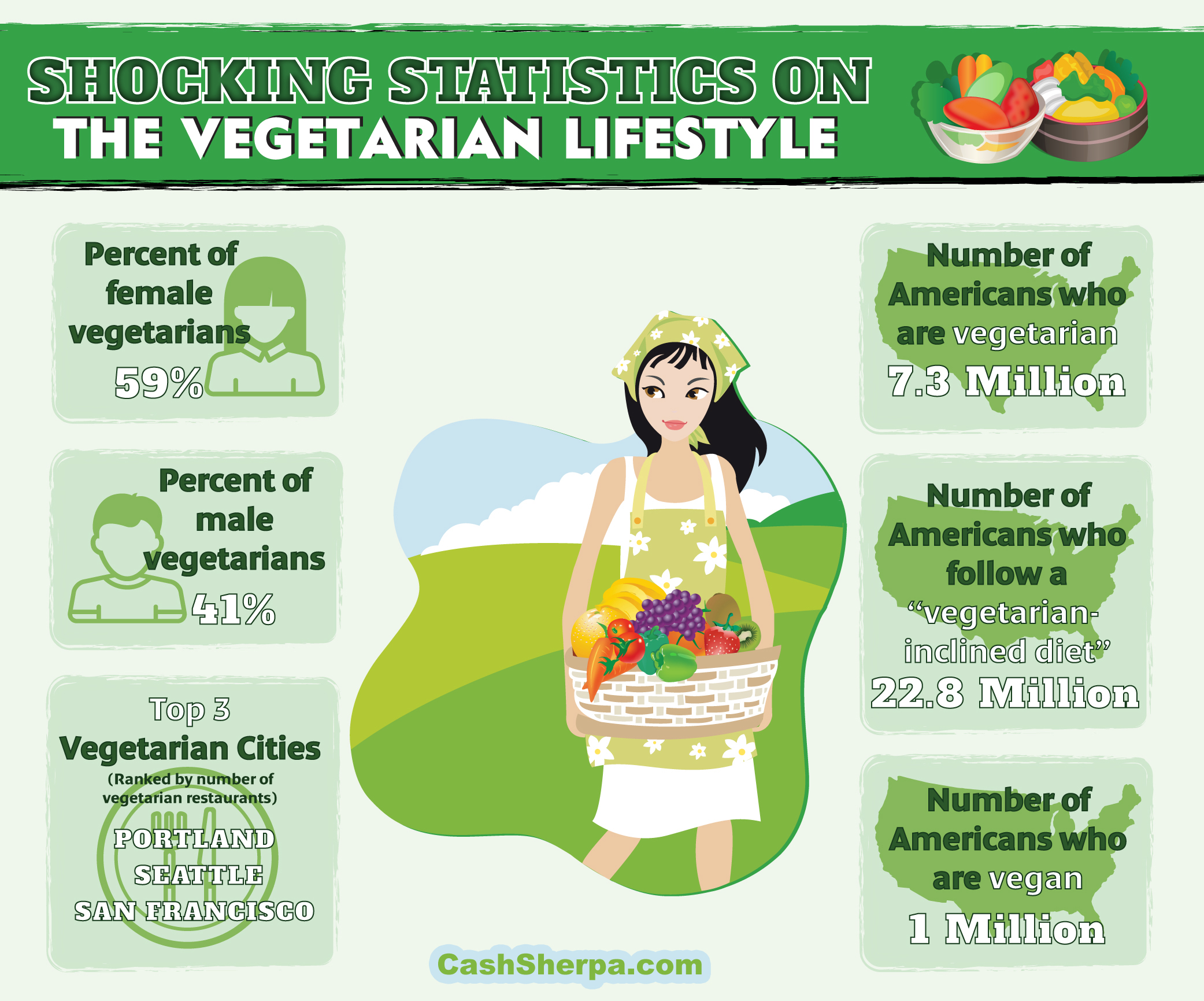Discover Statistics That Redefine astonishing data that highlights the rise, impact, and benefits of vegetarianism worldwide.
Global Rise of Vegetarianism
Studies show that approximately 8% of the global population follows a vegetarian diet, marking a significant rise in plant-based eating trends (Statista).
Health Benefits Drive the Shift
Nearly 60% of vegetarians cite health improvement as their main motivation for adopting a plant-based lifestyle (NIH Study).
Reduced Risk of Chronic Diseases
Vegetarians have been found to have lower rates of heart disease, diabetes, and hypertension compared to omnivores, emphasizing the lifestyle’s preventive potential (American Heart Association).
Environmental Impact of Plant-Based Diets
Switching to a vegetarian diet can reduce an individual’s carbon footprint by up to 50% (FAO Report), showcasing its ecological significance.

Protein Sources for Vegetarians
Legumes, tofu, tempeh, nuts, and seeds provide sufficient protein for vegetarians, dispelling myths about inadequate intake (Healthline).
Demographics and Age Groups
Young adults aged 18–34 make up the largest percentage of vegetarians worldwide, indicating a generational shift toward plant-based eating (Pew Research).
Weight Management Success
Vegetarians generally maintain a lower body mass index (BMI) than omnivores, highlighting the diet’s role in healthy weight management (NIH Study).
Global Vegan and Vegetarian Product Growth
The global market for plant-based foods is projected to reach $35 billion by 2027, reflecting the increasing demand for vegetarian options (GlobeNewswire).
Influence of Social Media
Instagram and TikTok have amplified vegetarian trends, with millions of users following plant-based influencers, recipes, and lifestyle tips (Forbes).
Gender Differences in Adoption
Women are more likely to adopt vegetarian diets than men, with studies showing 70% of vegetarians are female in certain regions (NIH Study).
Regional Popularity of Vegetarianism
India has the highest percentage of vegetarians globally, with nearly 30% of the population following plant-based diets, illustrating cultural and religious influences (World Atlas).
For personalized guidance on adopting a vegetarian lifestyle, visit our Contact Us page.
The Global Growth of Vegetarianism
Over the past decade, vegetarianism has grown exponentially, with millions worldwide adopting plant-based diets. This rise reflects increasing awareness of health, environmental sustainability, and ethical eating.
Health Benefits Drive Adoption
Many individuals adopt vegetarian diets to reduce the risk of chronic diseases. Studies show vegetarians often have lower blood pressure, improved cholesterol levels, and reduced incidence of heart disease.
Impact on Body Weight
Vegetarians generally maintain lower body mass indexes (BMI) compared to omnivores. Increased fiber intake and reduced calorie density contribute to sustainable weight management and improved metabolic health.
Protein Diversity in Vegetarian Diets
Legumes, lentils, tofu, tempeh, nuts, and seeds provide abundant protein options. Combining these foods throughout the day ensures a complete amino acid profile for muscle growth and repair.
Reduced Risk of Diabetes
Vegetarian diets rich in whole grains, vegetables, and legumes help regulate blood sugar and improve insulin sensitivity, reducing the risk of type 2 diabetes.
Cholesterol and Heart Health
Plant-based diets lower LDL cholesterol and increase HDL cholesterol, supporting cardiovascular health and reducing the risk of heart attacks and strokes.
Fiber Intake and Digestive Health
Vegetarian diets are naturally high in fiber, promoting regular bowel movements, feeding beneficial gut bacteria, and reducing the risk of gastrointestinal disorders.
Micronutrient Considerations
While vegetarians thrive on plant foods, monitoring vitamin B12, iron, calcium, and vitamin D is crucial to prevent deficiencies and maintain optimal health.
Vitamin B12 Supplementation
Since B12 is primarily found in animal products, vegetarians should use fortified foods or supplements to prevent anemia, neurological issues, and fatigue.
Iron Sources and Absorption
Spinach, lentils, chickpeas, and pumpkin seeds provide non-heme iron. Pairing them with vitamin C-rich foods enhances absorption, supporting energy and red blood cell production.
Calcium and Bone Health
Leafy greens, fortified plant milks, almonds, and tofu provide calcium to strengthen bones and prevent osteoporosis in long-term vegetarians.
Omega-3 Fatty Acids for Brain Health
Chia seeds, flaxseeds, hemp seeds, and walnuts supply ALA, a plant-based omega-3 essential for brain function, cognitive clarity, and reducing inflammation.
Antioxidants and Cellular Protection
Fruits, vegetables, and nuts provide antioxidants that combat oxidative stress, protect cells, and reduce the risk of chronic diseases.
Environmental Benefits of Vegetarianism
Plant-based diets reduce greenhouse gas emissions, lower water usage, and promote sustainable agriculture, making vegetarianism environmentally impactful.
Reduction of Carbon Footprint
Individuals switching to vegetarian diets can cut their carbon footprint by nearly 50%, showcasing significant contributions to global environmental sustainability.
Global Market Trends
The global market for plant-based foods is projected to surpass $35 billion, reflecting the growing consumer demand for vegetarian and vegan products.
Demographics and Age Influence
Young adults and urban populations are more likely to adopt vegetarian diets, signaling a generational shift towards conscious, health-focused eating habits.
Gender Differences in Adoption
Studies show women are more likely to become vegetarians than men, influenced by health concerns, ethical reasons, and societal trends.
Social Media Influence
Instagram, TikTok, and YouTube have amplified vegetarian trends, with millions following plant-based influencers, recipes, and lifestyle advice.
Global Vegetarian Hotspots
India, Israel, and certain European countries have high vegetarian populations, often influenced by culture, religion, and societal norms.
Weight Management Success
Vegetarian diets promote satiety and reduce overeating, contributing to healthier body weight and reduced risk of obesity.
Mental Health and Mood
Diets rich in magnesium, B-vitamins, and antioxidants help improve mood, reduce stress, and support cognitive function in vegetarians.
Eye Health Benefits
Carotenoids like lutein and zeaxanthin, found in leafy greens and carrots, protect against macular degeneration and maintain vision health.
Joint Health and Anti-Inflammatory Diets
Anti-inflammatory foods like turmeric, ginger, berries, and leafy greens reduce joint pain, improve flexibility, and support musculoskeletal health.
Meal Planning for Nutrient Adequacy
Balanced meal planning with diverse plant foods ensures all essential nutrients are met, preventing deficiencies and promoting optimal wellness.
Fermented Foods for Gut Microbiome
Tempeh, miso, sauerkraut, and kimchi support gut health by introducing beneficial bacteria and improving digestion and immunity.
Hydration Through Plant-Based Foods
Water-rich fruits and vegetables like cucumbers, watermelon, and oranges enhance hydration, support kidney function, and maintain cellular health.
Mindful Eating Practices
Eating slowly, savoring meals, and focusing on whole, nutrient-rich foods improves digestion, absorption, and overall satisfaction in a vegetarian lifestyle.
Global Awareness and Advocacy
Vegetarianism is increasingly promoted through educational campaigns, documentaries, and advocacy, driving worldwide adoption and reshaping dietary norms.
Integration with Fitness and Wellness
Vegetarian diets complement active lifestyles, providing energy, nutrients, and recovery support for athletes, yogis, and fitness enthusiasts.
Plant-Based Meal Prepping for Success
Meal prepping with a variety of vegetables, grains, and legumes ensures nutrient balance throughout the week. This practice helps vegetarians save time, reduce food waste, and maintain consistent healthy eating habits.
Seasonal Vegetables and Nutrient Density
Consuming seasonal produce provides higher nutrient content and better taste. Seasonal eating also reduces environmental impact, supporting sustainable farming and local economies.
Global Adoption Trends in Urban Areas
Urban populations are more likely to adopt vegetarian diets due to access to diverse plant-based foods, restaurants, and exposure to wellness information through media and communities.
Ethical Considerations Driving Adoption
Many individuals choose vegetarianism to reduce animal cruelty and support ethical food practices. Awareness campaigns, documentaries, and social media influence these ethical decisions.
Economic Benefits of a Vegetarian Lifestyle
Plant-based diets are often more cost-effective when focusing on legumes, grains, and seasonal vegetables. Reducing meat consumption can significantly lower grocery bills over time.
Influence of Cultural and Religious Practices
Cultural traditions and religious beliefs, such as Hinduism and Buddhism, promote vegetarian diets, contributing to high adoption rates in specific regions like India and Southeast Asia.
Vegetarianism and Longevity
Studies suggest that vegetarians may experience longer lifespans due to lower rates of chronic diseases, improved metabolic health, and a diet rich in antioxidants and phytonutrients.
Plant-Based Omega-3s for Heart and Brain
ALA from flaxseed, chia, and hemp seeds provides essential omega-3 fatty acids, reducing inflammation, supporting cardiovascular health, and enhancing cognitive function in vegetarians.
Fermented Foods and Immune Support
Incorporating kimchi, tempeh, miso, and sauerkraut enhances gut microbiome diversity, strengthens immunity, and improves nutrient absorption for overall health.

Vegetarian Diets and Blood Sugar Control
High fiber intake from legumes, whole grains, and vegetables stabilizes blood glucose levels, reduces insulin spikes, and supports long-term metabolic health in vegetarians.
Hydration Strategies for Plant-Based Diets
Water-rich fruits, vegetables, and plant-based beverages help vegetarians maintain optimal hydration, support kidney function, and enhance energy levels throughout the day.
Fitness Performance on a Vegetarian Diet
With proper protein sources, complex carbs, and nutrient timing, vegetarians can excel in endurance, strength, and recovery, proving plant-based diets are suitable for athletes.
Global Awareness Campaigns
Nonprofits, social media movements, and documentaries educate the public about the benefits of vegetarian diets, increasing adoption and reshaping dietary norms worldwide.
Plant-Based Diets and Stress Reduction
Diets rich in magnesium, B-vitamins, and antioxidants help lower cortisol levels, improve mood, and support mental resilience, making vegetarianism beneficial for emotional well-being.
Meal Diversity for Nutritional Completeness
Rotating vegetables, legumes, grains, and fruits ensures a broad spectrum of vitamins and minerals. This diversity prevents deficiencies and enhances overall health in vegetarians.
Optimizing Breakfast for Vegetarians
Starting the day with a nutrient-rich breakfast, including oats, chia seeds, fruits, and plant-based proteins, helps maintain steady energy levels and sets a healthy tone for the rest of the day.
Vegetarian Meal Timing for Maximum Energy
Strategically spacing meals throughout the day supports stable blood sugar, improves focus, and enhances physical performance, making it easier for vegetarians to maintain energy.
Plant-Based Snacks to Prevent Cravings
Nuts, seeds, hummus with vegetables, and trail mix provide sustained energy and fiber, reducing the likelihood of unhealthy snacking and keeping vegetarians full between meals.
Adapting Traditional Recipes to Vegetarian Versions
Substituting meat with legumes, tofu, tempeh, or mushrooms in traditional dishes allows vegetarians to enjoy familiar flavors while maintaining a nutrient-rich diet.
Importance of Hydrating Foods
Vegetables like cucumber, lettuce, and zucchini, along with fruits such as watermelon and oranges, enhance hydration while providing vitamins and antioxidants.
Using Herbs and Spices for Health Benefits
Turmeric, garlic, cinnamon, and rosemary not only enhance flavor but also provide anti-inflammatory and antioxidant properties, supporting overall wellness for vegetarians.
Vegetarian Diets and Cognitive Performance
Omega-3s from flax, chia, and walnuts, along with antioxidants from berries and leafy greens, support memory, focus, and cognitive resilience in plant-based eaters.
Seasonal Superfoods for Immune Support
Eating seasonal vegetables and fruits such as kale, carrots, apples, and berries strengthens immunity, providing essential vitamins, minerals, and phytonutrients.
Balancing Macronutrients in Vegetarian Meals
Combining carbohydrates, proteins, and healthy fats in each meal ensures steady energy, proper metabolism, and nutrient adequacy, supporting overall health.
Plant-Based Diets and Gut Health
High-fiber foods and fermented products enhance gut microbiome diversity, improve digestion, and support immune function for vegetarians.
Weight Management and Satiety
Fiber-rich vegetables, legumes, and whole grains promote fullness and reduce caloric intake, helping vegetarians maintain healthy weight and metabolic function.
Vegetarian Diets for Heart Health
Consuming unsaturated fats, whole grains, legumes, and antioxidant-rich foods reduces LDL cholesterol and supports cardiovascular wellness in plant-based diets.
Stress Reduction Through Plant-Based Nutrition
Magnesium-rich foods, B-vitamins, and adaptogenic herbs reduce stress hormones, improve mood, and enhance emotional well-being for vegetarians.
Global Awareness and Advocacy
Educational campaigns, documentaries, and social media content help promote vegetarianism worldwide, increasing adoption and fostering community support for plant-based lifestyles.
Meal Rotation to Prevent Nutrient Gaps
Rotating different vegetables, grains, legumes, and nuts ensures vegetarians receive a wide spectrum of vitamins, minerals, and phytonutrients, preventing deficiencies and boosting health.
Frequently Asked Questions About Statistics That Redefine the Vegetarian Lifestyle
What are the most compelling Statistics That Redefine vegetarian health trends?
Global studies showing lower rates of heart disease, diabetes, and obesity among vegetarians are key Statistics That Redefine health outcomes for plant-based diets.
How do Statistics That Redefine diet choices influence adoption?
Surveys highlighting environmental benefits and ethical considerations serve as Statistics That Redefine why individuals choose vegetarian lifestyles.
Can Statistics That Redefine help track vegetarian population growth?
Yes, data from global surveys and reports provide Statistics That Redefine the rise in vegetarian adoption worldwide.
How do Statistics That Redefine nutrition adequacy in vegetarian diets?
Research showing sufficient protein, fiber, and micronutrient intake in plant-based diets are critical Statistics That Redefine dietary sufficiency.
Do Statistics That Redefine environmental impact support plant-based diets?
Carbon footprint and water usage data are key Statistics That Redefine the environmental benefits of vegetarian eating.
How do Statistics That Redefine mental health outcomes?
Studies on reduced stress, improved mood, and cognitive function serve as Statistics That Redefine mental wellness benefits of vegetarianism.
Can Statistics That Redefine longevity show health advantages?
Evidence indicating longer lifespans among vegetarians are important Statistics That Redefine longevity benefits.
How do Statistics That Redefine food preferences globally?
Data on vegetarian adoption rates across countries act as Statistics That Redefine cultural and regional food trends.
Do Statistics That Redefine weight management benefits exist?
Research showing lower BMI and healthier weight profiles are key Statistics That Redefine weight management success.
How do Statistics That Redefine protein intake dispel myths?
Data on diverse plant protein sources like legumes and tofu are Statistics That Redefine concerns about protein sufficiency in vegetarian diets.

Can Statistics That Redefine influence policy and food industry trends?
Market growth statistics and consumer demand reports serve as Statistics That Redefine strategies for sustainable food production.
How do Statistics That Redefine cardiovascular health outcomes?
Evidence of reduced cholesterol and heart disease rates are Statistics That Redefine cardiovascular benefits of vegetarian diets.
Do Statistics That Redefine support immune system benefits?
Data on nutrient-rich diets and antioxidant intake are Statistics That Redefine immune system improvement in vegetarians.
How do Statistics That Redefine global market growth?
Plant-based food sales and market expansion statistics act as Statistics That Redefine economic trends in the vegetarian industry.
Can Statistics That Redefine dietary satisfaction be measured?
Surveys showing high satisfaction and adherence among vegetarians are Statistics That Redefine dietary contentment and lifestyle sustainability.
How do Statistics That Redefine youth adoption trends?
Data showing higher vegetarian rates among young adults serve as Statistics That Redefine generational dietary shifts.
Do Statistics That Redefine gender differences exist?
Research indicating more women adopt vegetarian diets are Statistics That Redefine gender-based adoption patterns.
How do Statistics That Redefine sustainable practices in agriculture?
Studies highlighting lower resource consumption in plant-based diets are Statistics That Redefine sustainability measures.
Can Statistics That Redefine public perception of vegetarianism?
Survey data on attitudes and awareness are Statistics That Redefine how society views plant-based lifestyles.
How do Statistics That Redefine social media influence trends?
Engagement and following of vegetarian influencers serve as Statistics That Redefine digital trends impacting dietary choices.
How do Statistics That Redefine global vegetarian awareness campaigns?
Data on educational initiatives, documentaries, and nonprofit programs act as Statistics That Redefine efforts to increase vegetarian awareness worldwide.
Can Statistics That Redefine meal planning effectiveness?
Research showing balanced nutrient intake and adherence to plant-based meal plans serve as Statistics That Redefine practical strategies for healthy vegetarian lifestyles.
How do Statistics That Redefine vegetarian lifestyle satisfaction?
Survey data showing higher energy, improved health, and lifestyle satisfaction among vegetarians act as Statistics That Redefine quality-of-life outcomes.
Can Statistics That Redefine environmental awareness through diet choices?
Reports highlighting reduced carbon footprints and water usage from plant-based diets serve as Statistics That Redefine the impact of dietary choices on the environment.
How do Statistics That Redefine global food trends for plant-based diets?
Market analysis and consumer behavior reports act as Statistics That Redefine emerging trends in plant-based eating worldwide.






